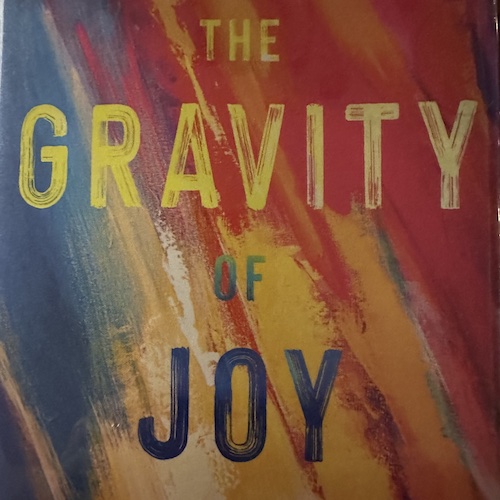How to find joy when life seems awful is my kind of clickbait, though absolutely not in the perjorative sense of the word. Cruising through headlines a couple weeks ago I saw this one from the Washington Post and clicked. In the article author Steven Petrow describes his sister Julie’s “birthday bash/going away party” celebrated during her final days living with ovarian cancer. He says, “We were inhabiting a liminal space between life and death, a space large enough to hold both our joy and our sorrow.” Within the essay he quotes Angela Williams Gorrell, from her book The Gravity of Joy: A Story of Being Lost and Found, “Joy has a mysterious capacity to be felt alongside sorrow and even … in the midst of suffering.”
The Gravity of Joy. That title caught my eye and so I requested the book from the library and when it came, I read it straight through. In it Gorrell weaves stories from her own terrible season of loss and deep grief, which she calls “my family’s weeks of hell” into her reflections on the nature of joy.
Gorrell was hired by Yale University in 2016 to work in their Center for Faith & Culture researching the theology of joy, and to also teach the Yale undergraduate course, Life Worth Living. Not long into this work at Yale, three close family members died in quick succession and Gorrell suddenly found herself dropped into the deep end with grief and its attendant emotions. Her book Gravity of Joy is a theological memoir, tracing the nature of Christian joy through deep sorrow as experienced in the context of suicide and drug abuse.
In the year following these traumatic losses, Gorrell began volunteering at a maximum security prison for women, and here she encountered joy obviously at work in the resistance against despair. She tells some of these stories in her book and sorts through the implications.
I really appreciated her investigation into the nature of joy – what it is and how to access it. Gorrell quotes psychiatrist Warren Kinghorn, “Joy is characterized by freedom and vitality, the feeling of aliveness,” and amidst her storytelling Gorrell says, “If there is anything that I learned in the years following my family’s weeks of hell, it is that we cannot make joy like we make spaghetti. It is not as if we can do this, then this, then mix that in, and –ta-da!–joy! “
Gorrell uses this book to consider the ways that joy serves as “a counteragent to despair and investigates the ways joy breaks into our lives, proposing that it may found even in the darkest places. She says, “We can all live postured toward joy, alive to its possibility, even in the unlikeliest places, even in close proximity to our sorrow, even and most especially in the midst of our suffering. “
I agree.
I recommend this book. It rings true. If you want a shortcut though, you can listen to her 2021 conversation with Ryan McAnnally-Linz on the For the Life of the World podcast.
Speaking of that podcast and the Yale Center for Faith and Culture — it is a project I have been tracking since it began. I regularly dip into the podcast archives (funny though – I hadn’t listened to the Gorrell interview before), and earlier this summer I read the newly published book Life Worth Living by Mirsolov Volf and Ryan McAnnally-Linz, which I also recommend!! And while I’m at it, you might want to also check out Kelly Corrigan’s podcast, Kelly Corrigan Wonders, because back in May she did a series on the Life Worth Living book, including conversations with the authors and three episodes book clubbing with Kate Bowler and Claire Danes.

 Turning in the melon patch
Turning in the melon patch